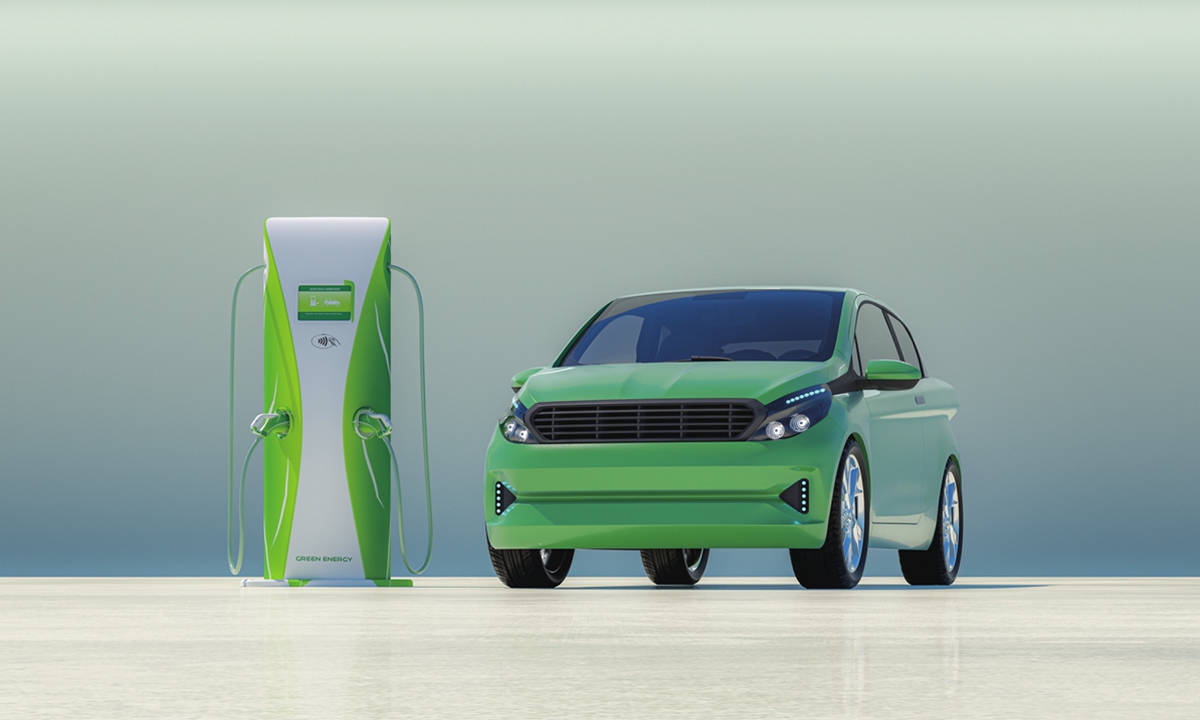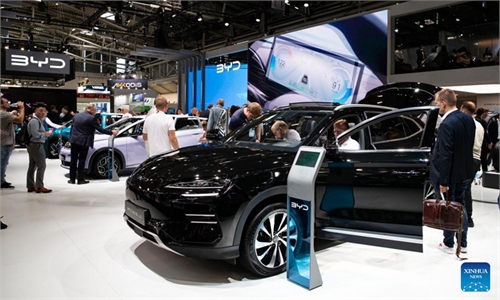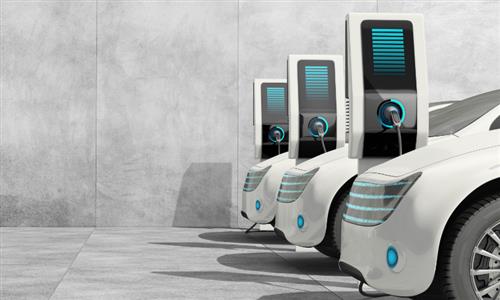EU’s anti-subsidy probe against Chinese EVs is protectionist move, clouding economic ties

Photo: NEV
The European Union announced last week to initiate an anti-subsidy probe into Chinese electric vehicles in order to protect Europe's own nascent EV industry. The move is widely believed to be a protectionist action aimed at hindering and stymieing one of China's new and rapidly rising manufacturing lines, which apparently contravenes the WTO's basic principle of free and fair competition.China's advantage in EV manufacturing is solely owing to the country's far-sighted vision that zero-emission EVs should replace highly polluting gasoline-powered vehicles on the streets, and the country's huge investment on battery research and development in the past two decades. By all metrics, the rapid growth of Chinese EVs is not grounds for an anti-subsidy investigation by EU.
It is true that China currently holds a superior position in the EV supply chain, with approximately three quarters of the world's battery production capacity, as the battery is the most important component of an EV and accounts for 40 percent of the vehicle's price. Also, China houses about half of the world's processing and refining capacity for lithium, cobalt and graphite, all essential materials for making EVs.
However, the market share of Chinese-made EVs remains very modest in Europe, with all Chinese EV brands combined representing a mere 11.3 percent of the EU EV market in August this year, less than Tesla's 15.3 percent.
China's EV exports in the recent years are seeing stronger volumes, not due to massive state subsidies, but because of the highly competitive Chinese industrial supply chain obtained through many years' implementation of "fair, free and fierce" market competition domestically, as China now has more than 500,000 EV-related enterprises scattered all over the country that forms a strong and unrivalled industrial chain. It is this massive manufacturing strength that sets up the foundation for the sector's take-off.
And, China's industries benefit greatly from its inherent supply chain advantages, lowering costs in logistics, labor and public-owned land management. Moreover, the country's increasingly growing and huge EV market enables economies of scale. According to international organizations' gauge, compared with the developed markets in the US, Japan and Europe, China's EV manufacturing industry has a cost advantage of at least 20 percent.
That's why Chinese EVs now exported to Europe are generally retailing at nearly double of its prices in China's home market. If the upcoming EU probe into China's EV sector is objective and fair, a simple comparison of the retailing EV prices in Chinese mainland and in overseas markets will draw the conclusion that Chinese EV makers are not squeezing their European counterparts with intentionally-set lower prices.
The advantage attained by Chinese carmakers is the result of the policymakers' determination to transition to green and sustainable economic growth and the country's political and social will to achieve carbon neutrality before 2060. Unlike some Western countries, China, after setting a target to relieve global climate change, won't pay lip service but invest heavily and steadily to achieve a breakthrough.
And, it is highly unusual that the European EV probe was brought by the European Commission, rather than in response to an industry complaint. Rather, the investigation has caused worries about the negative impacts it will have on free and healthy competition within the automotive industry and global supply lines.
"An open market is what drives growth and what drives wealth creation," said Mercedes Benz chief executive Ola Kallenius in a recent interview with Bloomberg. "Let's keep market open and let market participants fight it out." Fair and square, isn't it? The statements by Kallenius are revealing, given that the trade measure some EU politicians are seeking to adopt against China will only serve to erect market barriers and damage global automotive supply chains, in addition to inhibiting broad China-EU trade and economic relations. As Kallenius said, it will be "a complete illusion to think that we can divide the automotive world into individual regions."
As many industry insiders fear, the European Commission probe is largely of political meddling and manipulation. For example, the commission president von der Leyen has been using China as a bogeyman in order to score political points for herself. She accused China of "unfair trade practices" and alleged global markets "are now flooded with cheaper Chinese electric cars".
In EV battery research and development, China has just done it earlier, better and faster, and what's wrong with that? Back in 2009, the country was determined to spend billions of yuan building itself into the a battery superpower while "legacy" automotive powers like Japan remained suspicious of the coming new-energy vehicle revolution. And, as a matter of fact, at the close of 2022, China officially let the national subsidy program expire, though motorists are exempt from paying EV purchase tax to inspire EV consumption.
But China is not the only one supporting the development of new-energy cars. Under the Inflation Reduction Act approved by the US Congress, the Biden administration is providing massive subsides, worth $369 billion, to America-made EVs and clean technologies. And, the EU passed its Green Deal Industrial Plan by relaxing government aid rules, allowing more subsides. But von der Leyen will never criticize the US legislation of heavy EV sector subsidization, including $7,500 in premiums for motorists and separate assistance to localize battery production.
The opening of an EU investigation into imports of Chinese EVs has exposed a fundamental European rift over the right course for Europe's industrial strategy. "One thing is clear - an anti-subsidy investigation alone does not help resolve existing challenges with regards to the competitiveness of Europe", said the Association of the Automotive Industry (VDA), the main industry advocacy for Germany's mighty auto sector, citing the continent's elevated energy costs, taxes and excessive bureaucracy as drags.
On the contrary, the investigation will seriously hamstring Europe's efforts to reduce greenhouse emissions by phasing out new combustion engine vehicles from 2035. It would serve both sides' interests if China and EU could build a fair, non-discriminatory and predictable market environment for the development of the EV industry, and jointly address global climate change.
German Chancellor Olaf Scholz recently affirmed that the German government will allocate an additional 110 billion euros to promote EV development. The emphasis lies on enhancing competitiveness, not trade protectionism, which is good. Both EU and China should fervently encourage mutual investments in each other's companies, enhance bilateral new-energy vehicle industry and supply chains, and actively boost production and market expansion. This will ultimately lead to a mutually beneficial outcome.
The author is an editor with the Global Times. bizopinion@globaltimes.com.cn



